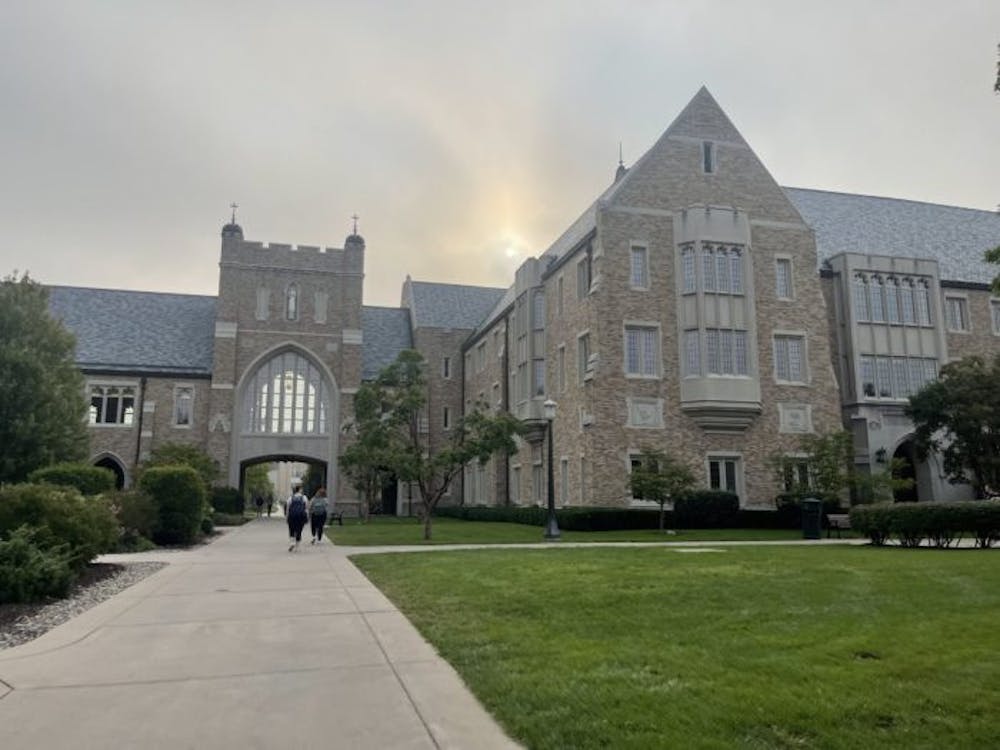As Notre Dame Law students have immersed themselves in their classes and reading this semester, they have also looked beyond the walls of the Law School, contributing to the San Carlos Apache people’s fight for their sacred lands through the Lindsay and Matt Moroun Religious Liberty Clinic.
As featured in Notre Dame’s award winning “What Would You Fight For?” series, Oak Flat, a mountainous area in the Tonto National Forest in Arizona, has a deep cultural significance to the Apache people, who use it for religious ceremonies and rely on it for some natural resources. The area is in danger of being marred with a crater two miles wide and 1,000 feet deep, the result of a proposed copper mining project by Resolution Copper. The land was transferred to Rio Tinto, the mining company that owns Resolution Copper, in a 2014 national defense bill, according to John Meiser, director of the clinic.
Apache Stronghold, a nonprofit organization of Native groups working together to protect Oak Flat, sought an injunction to block the land transfer and stop the project on the basis that it violated federal law and infringed upon religious liberties. Apache Stronghold v. United States has worked its way through the justice system since 2021 and now awaits to see whether it will be heard by the Supreme Court.
“The court hasn’t decided yet whether to hear [the case], and there’s no deadline [for their decision], but they’ll probably decide within the next several weeks whether they hear it or not,” Meiser said.
The clinic, one of seven offered as classes by the Law School, provides students with opportunities to learn from their experiences working on real cases. The hope is that students of all professional interests, ranging from exoneration justice to special education, can benefit from the opportunities the clinics provide.
“The whole mission is not just to represent our clients or just to participate in legal matters, but it’s to teach our students," Meiser said. “Every single thing we do in the clinics is with that goal, and it’s designed to allow students to take real leading roles in it.”
This October, the clinic filed an amicus curiae brief for the Apache Stronghold case in the Supreme Court, the fifth such brief in the life of the case. Students are the primary drafters and authors of the briefs, and after feedback and revision they are submitted to the court.
As Meiser explained, the goal of these briefs is to help spread the clients’ perspective on the case.
“This isn’t just something that matters to one tribal group, to the Apache in Arizona, it’s not something that matters to just one site, but there’s a broader problem of the government threatening or destroying native sacred lands, and it'’ a bigger issue that federal courts need to protect,” Meiser said.
Importantly, the clinic does not represent Apache Stronghold, the plaintiff in the federal case.
“We have represented a coalition of tribal interest groups who are interested in the outcome of the case,” Meiser said. “They personally, perhaps don’t go to Oak Flat, but they recognize the importance of protecting sacred sites like Oak Flat for their own tribes.”
The Apache Stronghold case is just one of the clinic’s many cases fighting for religious liberty. It filed another amicus curiae brief in the case Perez v. City of San Antonio, which was argued in the Texas Supreme Court on Dec. 4 and involved the protection of a religious site on the San Antonio river. It recognized that there was a need for the protection of land-based religions and acted accordingly.
Similarly, while working for a federal judge, Meiser saw a need within the legal profession.
“Over that time, it became very obvious to me, both that there are an awful lot of religious freedom cases that are interesting and complex, and that the rights at their core are important, but also that there’s a real need for good lawyering in these cases,” Meiser said.
As the director of the clinic, which was created in 2020, he teaches the class and guides students as they make their contributions to real world cases.
“That really spoke to me where I thought, if there’s a way to serve and to help using your talents as a lawyer, this is an area that it’s toward a fundamental right that everyone shares and everyone needs,” he said.










